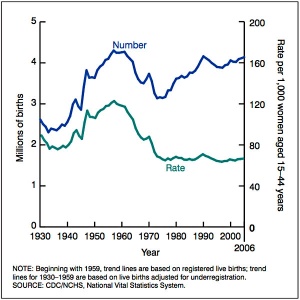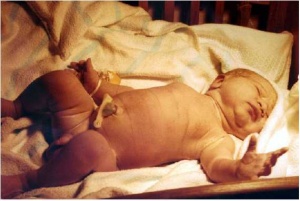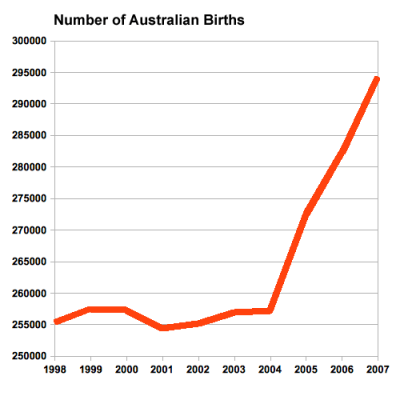Birth Statistics: Difference between revisions
| Line 15: | Line 15: | ||
[[File:Australian-births 2007.png|400px]] | [[File:Australian-births 2007.png|400px]] | ||
==USA | |||
==USA Live Births and Fertility Rates== | |||
'''2007 Data''' <ref>USA National Vital Statistics System - [http://www.cdc.gov/nchs/births.htm Birth Data]</ref> | |||
Number of births: 4,317,119 | |||
Birth rate: 14.3 per 1,000 population | |||
Fertility rate: 69.5 births per 1000 women aged 15-44 years | |||
Percent born low birthweight: 8.2% | |||
Percent unmarried: 39.7% | |||
'''2006 Data''' Martin JA, Hamilton BE, Sutton PD, Ventura SJ, et al. Births: Final data for 2006. National vital statistics reports; vol 57 no 7. Hyattsville, MD: National Center for Health Statistics. 2009. [http://www.cdc.gov/nchs/data/nvsr/nvsr57/nvsr57_07.pdf National vital statistics reports; vol 57 no 7 PDF] | |||
Graph source - Births: Final data for 2006<ref>Martin JA, Hamilton BE, Sutton PD, Ventura SJ, et al. Births: Final data for 2006. National vital statistics reports; vol 57 no 7. Hyattsville, MD: National Center for Health Statistics. 2009. [http://www.cdc.gov/nchs/data/nvsr/nvsr57/nvsr57_07.pdf PDF]</ref> | |||
'''2005 Data''' | |||
An estimated 6,408,000 pregnancies resulted in 4.14 million live births, 1.21 million induced abortions, and 1.06 million fetal losses.<ref>MacDorman M, Menacker F, Declercq E. Trends and characteristics of home and other out-of-hospital births in the United States, 1990–2006. National vital statistics reports; vol 58 no 11. Hyattsville, MD: National Center for Health Statistics. 2010. [http://www.cdc.gov/nchs/data/nvsr/nvsr58/nvsr58_11.pdf PDF]</ref> | |||
[[File:USA live births and fertility rates.jpg|300px]] | |||
<gallery> | <gallery> | ||
Revision as of 01:44, 27 May 2010
Introduction
Birth or parturition is a critical stage in development, representing in mammals a transition from direct maternal support of fetal development, physical expulsion and establishment of the newborns own respiratory, circulatory and digestive systems. These notes only cover the biological processes surrounding birth including fetal signaling changes and maternal signaling changes. Note that there is a growing worldwide trend in developed countries toward caesarean section delivery. There are a great number of comprehensive, scientific and general, books and articles that cover birth, childbirth or parturition. The time surrounding birth is known as the perinatal period.
Additional graphs see Category:Birth
Australian Data
In 1903, when the crude birth rate was lower than it had ever been before, the Royal Commission On the Decline in the Birth-rate and On the Mortality of Infants in New South Wales was appointed. It reported in 1904 and concluded that "...the cause or causes of the Decline of the Birth-rate must be a force or forces over which the people themselves have control..." in other words, couples were limiting the size of their families.
For mor detailed statistics see Australia’s mothers and babies 2007.
USA Live Births and Fertility Rates
2007 Data [1] Number of births: 4,317,119 Birth rate: 14.3 per 1,000 population Fertility rate: 69.5 births per 1000 women aged 15-44 years Percent born low birthweight: 8.2% Percent unmarried: 39.7%
2006 Data Martin JA, Hamilton BE, Sutton PD, Ventura SJ, et al. Births: Final data for 2006. National vital statistics reports; vol 57 no 7. Hyattsville, MD: National Center for Health Statistics. 2009. National vital statistics reports; vol 57 no 7 PDF
Graph source - Births: Final data for 2006[2]
2005 Data
An estimated 6,408,000 pregnancies resulted in 4.14 million live births, 1.21 million induced abortions, and 1.06 million fetal losses.[3]

USA live births and fertility rates[4]
USA triplet birth rate[5]
USA percentage low birthweight by maternal age[6]
USA change distribution births by gestational age[7]
USA Mean age mother first birth by state[8]
USA cesarean rate by gestational age[9]
USA pregnancy by age 2000 and 2005[10]
USA birth location 1990-2006[11]
USA out-of-hospital births 1990-2006[12]
USA antenatal steriod and surfactant treatment 2006[13]
Infant mortality rates 1995 and 2000[14]
References
- ↑ USA National Vital Statistics System - Birth Data
- ↑ Martin JA, Hamilton BE, Sutton PD, Ventura SJ, et al. Births: Final data for 2006. National vital statistics reports; vol 57 no 7. Hyattsville, MD: National Center for Health Statistics. 2009. PDF
- ↑ MacDorman M, Menacker F, Declercq E. Trends and characteristics of home and other out-of-hospital births in the United States, 1990–2006. National vital statistics reports; vol 58 no 11. Hyattsville, MD: National Center for Health Statistics. 2010. PDF
- ↑ Martin JA, Hamilton BE, Sutton PD, Ventura SJ, et al. Births: Final data for 2006. National vital statistics reports; vol 57 no 7. Hyattsville, MD: National Center for Health Statistics. 2009. PDF
- ↑ Martin JA, Hamilton BE, Sutton PD, Ventura SJ, et al. Births: Final data for 2006. National vital statistics reports; vol 57 no 7. Hyattsville, MD: National Center for Health Statistics. 2009. PDF
- ↑ Martin JA, Hamilton BE, Sutton PD, Ventura SJ, et al. Births: Final data for 2006. National vital statistics reports; vol 57 no 7. Hyattsville, MD: National Center for Health Statistics. 2009. PDF
- ↑ Martin JA, Hamilton BE, Sutton PD, Ventura SJ, et al. Births: Final data for 2006. National vital statistics reports; vol 57 no 7. Hyattsville, MD: National Center for Health Statistics. 2009. PDF
- ↑ Martin JA, Hamilton BE, Sutton PD, Ventura SJ, et al. Births: Final data for 2006. National vital statistics reports; vol 57 no 7. Hyattsville, MD: National Center for Health Statistics. 2009. PDF
- ↑ Martin JA, Hamilton BE, Sutton PD, Ventura SJ, et al. Births: Final data for 2006. National vital statistics reports; vol 57 no 7. Hyattsville, MD: National Center for Health Statistics. 2009. PDF
- ↑ Ventura SJ, Abma JC, Mosher WD, Henshaw SK. Estimated pregnancy rates for the United States, 1990–2005: An update. National vital statistics reports; vol 58 no 4. Hyattsville, MD: National Center for Health Statistics. 2009. PDF
- ↑ MacDorman M, Menacker F, Declercq E. Trends and characteristics of home and other out-of-hospital births in the United States, 1990–2006. National vital statistics reports; vol 58 no 11. Hyattsville, MD: National Center for Health Statistics. 2010. PDF
- ↑ MacDorman M, Menacker F, Declercq E. Trends and characteristics of home and other out-of-hospital births in the United States, 1990–2006. National vital statistics reports; vol 58 no 11. Hyattsville, MD: National Center for Health Statistics. 2010. PDF
- ↑ Osterman MJK, Martin JA, Menacker F. Expanded health data from the new birth certificate, 2006. National vital statistics reports; vol 58 no 5. Hyattsville, MD: National Center for Health Statistics. 2009.
- ↑ Mathews TJ, Menacker F, MacDorman MF. Infant mortality statistics from the 2000 period linked birth/infant death data set. National vital statistics reports; vol 50 no 12. Hyattsville, Maryland: National Center for Health Statistics. 2002. PDF
Search Pubmed: birth statistics
| System Links: Introduction | Cardiovascular | Coelomic Cavity | Endocrine | Gastrointestinal Tract | Genital | Head | Immune | Integumentary | Musculoskeletal | Neural | Neural Crest | Placenta | Renal | Respiratory | Sensory | Birth |


![USA live births and fertility rates[4]](/embryology/images/thumb/1/1f/USA_live_births_and_fertility_rates.jpg/120px-USA_live_births_and_fertility_rates.jpg)
![USA triplet birth rate[5]](/embryology/images/thumb/1/1f/USA_triplet_birth_rate.jpg/117px-USA_triplet_birth_rate.jpg)
![USA percentage low birthweight by maternal age[6]](/embryology/images/thumb/6/69/USA_percentage_low_birthweight_by_maternal_age.jpg/120px-USA_percentage_low_birthweight_by_maternal_age.jpg)
![USA change distribution births by gestational age[7]](/embryology/images/thumb/7/73/USA_change_distribution_births_by_gestational_age.jpg/120px-USA_change_distribution_births_by_gestational_age.jpg)
![USA Mean age mother first birth by state[8]](/embryology/images/thumb/6/63/USA_Mean_age_mother_first_birth_by_state.jpg/120px-USA_Mean_age_mother_first_birth_by_state.jpg)
![USA cesarean rate by gestational age[9]](/embryology/images/thumb/2/2c/USA_cesarean_rate_by_gestational_age.jpg/120px-USA_cesarean_rate_by_gestational_age.jpg)
![USA pregnancy by age 2000 and 2005[10]](/embryology/images/thumb/8/89/USA_pregnancy_by_age_2000_and_2005.jpg/120px-USA_pregnancy_by_age_2000_and_2005.jpg)
![USA birth location 1990-2006[11]](/embryology/images/thumb/3/30/USA_birth_location_1990-2006.jpg/120px-USA_birth_location_1990-2006.jpg)
![USA out-of-hospital births 1990-2006[12]](/embryology/images/thumb/1/19/USA_out-of-hospital_births_1990-2006.jpg/120px-USA_out-of-hospital_births_1990-2006.jpg)
![USA antenatal steriod and surfactant treatment 2006[13]](/embryology/images/thumb/a/a4/USA_antenatal_steriod_and_surfactant_treatment_2006.jpg/120px-USA_antenatal_steriod_and_surfactant_treatment_2006.jpg)
![Infant mortality rates 1995 and 2000[14]](/embryology/images/thumb/2/2c/USA_Infant_mortality_rates_1995_and_2000.jpg/120px-USA_Infant_mortality_rates_1995_and_2000.jpg)